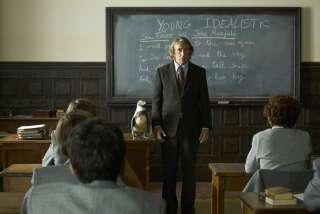Book review: ‘The Evolution of Bruno Littlemore’ by Benjamin Hale
- Share via
Sprawling, ambitious, aiming to shock as well as to illuminate, “The Evolution of Bruno Littlemore” is a classic example of an overreaching first novel. It requires a strong stomach and considerable patience to stick with Benjamin Hale’s protagonist, a chimpanzee who can speak and read, through the story’s increasingly lurid first half (well, two-thirds). As he acquires language and self-awareness, Bruno finds a companion — a companion in every sense of the word — in his human caretaker Lydia, bites off the finger of a worker at the University of Chicago’s Behavioral Biology Lab, freaks out at an exhibition of his paintings and trashes the gallery.
The author rubs our noses in the grotesque, capping the odyssey of Bruno’s formative years with the discovery that Lydia has a brain tumor and is pregnant by her chimpanzee lover. It’s no surprise that these revelations, splashed across the media and joked about on late-night talk shows, provoke a bloody attack by a religious fundamentalist who cites the Bible as his justification. In Hale’s gaudy carnival, more is always better.
Voice is everything in a novel this aggressive, and Bruno’s first-person narration never fails to provoke and compel. He is dictating his memoirs at the Zastrow National Primate Research Center in Georgia, where he has been confined for nine years after killing someone in 1999. He continues to paint “to salve the wounds of my troubled heart,” and he is staging a production of “Woyzeck,” “casting across species” with both chimps and humans. Bruno himself, of course, will play the title role, a man provoked to murder by injustice and cruelty.
A line from “Woyzeck” serves as one of the novel’s epigraphs, along with quotations from “Measure for Measure,” “Paradise Lost” — and “Planet of the Apes.” Bruno’s elaborate language and literary references flag the author’s intentions; he is not speculating about the real-life possibility of primates learning to read Milton. Bruno is — again, in the time-honored manner of first novels — a vehicle for expressing his creator’s opinions on such topics as the disorienting effects of modern transportation and the sinister nature of Barbie dolls.
Hale’s central subject is human arrogance, and Bruno feels its appeal before he discerns its destructive blindness. In the early days of his training at the lab, he climbs a tree in the building’s courtyard, from which he can see the skyscrapers of downtown Chicago, “reaching up out of the earth like the fingers of enormous demons clawing their way out of hell to assault the heavens.” Contrasting these superb human achievements with the “poverty of mind and poverty of experience” of his relatives in the Lincoln Park Zoo, Bruno tells us, “I climbed down from that tree to spend the rest of my life running from the yawning darkness of animal terror toward the light of fire stolen from the gods.”
That divine fire is language, which is also demonic. “Like Satan, I made myself with words,” Bruno declares, and he revels in their power. Language didn’t simply enable Bruno to communicate his thoughts and feelings; it gave birth to them. Language is also the weapon humans wield to assert the right to rule and pillage creation; words are “sticks to beat back the terror that crouches always just behind us, in our past, in our bodies, in our delicate animal selves.”
Flinging metaphysical challenges at his readers interests Hale more than the people who serve as foils in Bruno’s epic journey. Lydia is a cipher, her boss at the lab a cartoon villain; the rest of the human cast are sketched in just enough detail to fulfill their plot functions. The Falstaffian exception is Leon, an itinerant actor who becomes Bruno’s only real friend after his flight to New York City in the wake of the fundamentalist’s attack. Leon’s whacked-out staging of “The Tempest” in a dank Manhattan basement (with Bruno as Caliban) perfectly embodies Hale’s essential theme, evoking the magic of creation and then bringing us up short with a sardonic reality check.
Excessive, often abrasive, overstuffed with ideas that are not always coherently developed, “The Evolution of Bruno Littlemore” is far from perfect. But it throbs with energy and boils with passion as it expresses a dark vision of our essential nature that strikes uncomfortably home.
Smith is a contributing editor for the American Scholar and reviews books for The Times, the Washington Post and the Chicago Tribune.
More to Read
The biggest entertainment stories
Get our big stories about Hollywood, film, television, music, arts, culture and more right in your inbox as soon as they publish.
You may occasionally receive promotional content from the Los Angeles Times.










